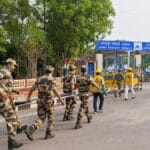Barak Hostel reservation for Northeast students has become a point of contention at Jawaharlal Nehru University (JNU), as the much-anticipated inclusion plan has reportedly failed to deliver on its promises. Students from the Northeast are voicing disappointment over what they see as a lack of institutional support and transparency.

The dormitory was named after the Barak river, which traverses Manipur, Nagaland, and Assam. Its goal was to give Northeast students a secure, welcoming environment. However, the stated 75% reservation was not put into effect when the initial allotment list was released.
New Delhi: With a pledge to reserve 75% of the rooms for Northeast Indian students, Jawaharlal Nehru University (JNU) lay the foundation stone for Barak Hostel on July 24, 2017. Being the first hostel of its kind since the university’s founding in 1969, this was a revolutionary decision.
Barak Hostel Reservation for Northeast Students Ignored: Only 8 Out of 88 Seats Allotted as Promised Quota Overlooked
Named after the Barak river, which flows through Manipur, Nagaland, and Assam, the hostel was designed to accommodate 446 students across 228 rooms and aimed to support the Barak Hostel Reservation for Northeast Students by providing a safe, inclusive space on campus. This initiative was especially important for students from the Northeast, who often face discrimination and struggle to find affordable housing in Delhi.
However, when the first allotment list was published on April 8, the promised 75% Barak Hostel Reservation for Northeast Students was not implemented. Out of the 88 students allotted seats in the hostel, only eight were from the Northeast—sparking outrage and disappointment among those who had hoped the policy would ensure fair representation.
The Barak Hostel Reservation for Northeast Students project had its origins in 2013 when the Northeast Students Forum (NESF) began advocating for a dedicated hostel for Northeast students. In response to the 2014 murder of Nido Tania, a student from Arunachal Pradesh, the demand for a safe facility gained national momentum. By 2016, the Ministry of Development of North Eastern Region (DoNER) agreed to fund the project, and an MoU was signed between JNU and the North Eastern Council (NEC) that explicitly stipulated a 75% reservation of the hostel seats for Northeast students. This agreement, forming the core of the Barak Hostel Reservation for Northeast Students initiative, assured students that their needs would be prioritized.
In front of notable Northeast Indian dignitaries, Union Minister for Development of the Northeastern Region Jitendra Singh lay the hostel’s foundation stone. 75% of the seats would be set aside for kids from the area, according to another official announcement made at the time. Union Home Minister Amit Shah declared the dormitory a long-held aspiration of the Northeast people when he officially opened the project in February 2024.
Manuradha Chaudhary, the student dean, met with NESF representatives on April 1 but refuted any formal pledge to implement the 75% reservation. She maintained that the spirit of JNU, which opposes community-based reservations in dorms, would be violated by such a clause. Despite having no legal proof to support her claim, she gave Northeast students “unofficial” preference in all of the university’s residence halls. Regarding cultural integration, she rejected the notion of serving Northeast cuisine in the dorm’s kitchen, arguing that, like in other dorms, students could only ask for it if they were elected mess secretaries.
During the Barak Hostel Reservation for Northeast Students initiative, the Northeast Students Forum (NESF) organized a silent protest during the hostel inauguration on April 7. Amid the demonstration, JNU Vice-Chancellor Santishree Dhulipudi Pandit clarified that the university would not implement any reservation specific to Northeast students in the hostel. She stated, “We [JNU] cannot reserve any hostel… otherwise, we refuse to take the hostel and make it into an administrative block… JNU follows the constitution of India… no separation of any identity on this campus.” This stance directly challenges the core promise of the Barak Hostel Reservation for Northeast Students, intensifying calls for greater accountability and inclusivity on campus.
Many students in the Northeast are disillusioned by this disregard for their needs.
“When it comes to safety, we all remember the case of Nido Tania in 2014 – it gained national attention. But the truth is, many such incidents go unnoticed simply because they aren’t as high-profile. In those everyday moments, we do face subtle and direct forms of discrimination,” said Nokentemla Longkumer, convener of NESF. His remarks highlight the urgency of reform within the framework of the Barak Hostel Reservation for Northeast Students initiative, reinforcing the call for a dedicated space that not only prioritizes safety but also addresses systemic discrimination encountered by Northeast students.
She also expressed frustration at the lack of consultation during protests by the JNU students’ union demanding the quick opening of the Barak hostel as part of the Barak Hostel Reservation for Northeast Students initiative. “When protests began at JNU demanding the opening of Barak hostel, there was no consultation with Northeast students. Our concerns are pushed aside time and again,” Longkumer added.
At JNU, housing has long been a major concern for Northeast students. For students in the Northeast, housing is a significant obstacle. Finding reasonably priced and secure housing close to college is very challenging. I am among the many of us who have experienced these difficulties firsthand. Additionally, broker fees raise the cost, and some landlords forbid non-vegetarian cooking, which is problematic because non-vegetarian food is a mainstay of many of our diets, Longkumer said. She further emphasized that the goal of Barak Hostel was to solve these problems and help students who are having trouble paying for food and housing.
Lawmzuali, an assistant professor at Mizoram Christian College, former JNU student, and ex-NESF co-convener, underscored the urgency of the situation surrounding the Barak Hostel Reservation for Northeast Students. “We had high hopes when we learned that the NEC would be funding the project. However, when the construction was completed, the seat allotment still couldn’t be finalized. By that time, the urgency was very high for Northeast students, many of whom were waiting for the allotment list while temporarily residing in PGs or at relatives’ homes. The reality is that the majority of us struggle to survive here, relying on government stipends.”
Emphasising that the lack of representation of Northeast food on campus remains a significant concern, Lawmzuali highlighted another dimension of the issue surrounding the Barak Hostel Reservation for Northeast Students initiative. “One of the primary issues is food. Across the campus, there’s little to no representation of Northeast cuisine. We regularly see food from North and South India, but hardly anything from the Northeast. In 2018, when an attempt was made to serve chicken cooked with bamboo shoot, it received a lot of negative backlash,” Longkumer added. “For many of us, this matters. Some students can adapt to the food here, but not everyone can.
I’ve heard from several students that they’re forced to get food from outside or look for alternatives, which adds to their financial burden.” This gap in culturally appropriate offerings underscores the broader challenges that the Barak Hostel Reservation for Northeast Students was intended to resolve by ensuring a more inclusive campus environment.
Given the formal Memorandum of Understanding between JNU and the NEC, some students remain hopeful that the NEC and DoNER will step in to uphold the commitments of the Barak Hostel Reservation for Northeast Students initiative despite these setbacks. The dean of students at JNU was also contacted by The Wire for comment, but at the time of publication, no response was obtained.















